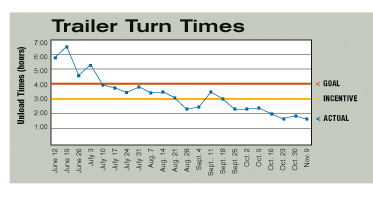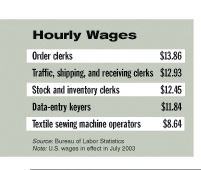In nearly every distribution center in the United States, workers are paid by the hour. While their productivity is (or should be) measured in units, pounds, or dollars, compensation is still based upon time rather than output. The one exception is the unloading or loading of trucks or boxcars.
Not long ago, we made the long journey to Bangalore, India, to conduct a two-day workshop on best practices in warehouse management. We were surprised and dismayed at the apparent lack of interest in productivity measurement, in contrast to the great interest displayed in other topics covered in the workshop. Only after the program was over were we able to discover why there was so little concern with productivity measurement. When we visited two commercial warehouses in the neighborhood, we found that virtually all of the work done in these facilities was handled by work crews who were paid a fee for each unit that they handled. Since the productivity risk had been delegated to the workers — or to their employment agency — neither the warehouse supervisors nor the managers had any reason to be concerned about productivity measurement or improvement. But when we observed this situation in India, we had no idea that similar practices might take place here at home.
Some of the same staffing services that have long provided unloading labor now offer to operate the entire warehouse and to charge for all the labor on a piecework basis. We have talked with three of these staffing services, and evidently there are others that are willing to do the same thing. The sources contacted in our research are Impact Logistics (www.loadingservice.com), Inprax Performance Resources (www.inprax.com), and InSource Contract Services (www.insourcecs.com).
Even though today’s typical fulfillment center requires work that is somewhat more complex than the loading or unloading of vehicles, you can probably find a staffing service that is willing to take over the warehouse operation on a piecework basis. When you do this, you might eliminate the need to measure material handling productivity, and you may also avoid costly mechanization. Furthermore, if you consider an investment in equipment that reduces labor, it should be possible to make an appropriate adjustment in the piecework fee that is paid to the staffing service — and ultimately to the warehouse workers. Finally, when labor is paid by the piece, you can readily budget the fulfillment cost per unit of every item that you sell.
In addition to warehousing, the piecework approach can be applied to a variety of tasks, such as packaging. Training, labor turnover, and overtime are delegated to the staffing service. Management is free to concentrate on computer systems, inventory management, customer service, and sales growth.
WHAT THEY DON’T DO
We have not discovered any staffing service that is willing to take on inventory responsibility. They are willing to tackle any job in the warehouse, but apparently not that one. At the same time, among the many cases we have examined (somewhat more than are discussed in this article), we have not heard of any situation where inventory control had become a problem.
SOME EXAMPLES
Todd Larson of AmeriCold Logistics in Rochelle, IL, began using staffing services from Impact Logistics last summer and experienced a dramatic improvement in trailer turn times. The figure below illustrates how Americold’s trailer turn times fell to less than two hours, or one-third the time expended before the company initiated piecework staffing.

Bill Bracey of Elmer’s Products Inc., contracted with Insource to handle the Columbus, OH-based consumer adhesives firm’s entire warehousing process. According to Bracey: “Insource applied their own engineers to drive process improvements. They came in with a turnkey solution, including a single point of contact to manage the entire operation, everything from recruiting and screening to production, quality, and reporting. Not only were we pleased with throughput, which more than doubled, but our cost dropped by nearly 50%.”
McLane Company is a grocery distributor specializing in shipments to convenience stores. Dennis Erickson manages the McLane cross-dock facility in Massachusetts, which operates on a 24/7 schedule with 20 employees. They use Inprax, and most operations in the warehouse are paid on a per- piece basis. An extra fee was negotiated to cover the learning curve and other normal startup issues. Today they have a stable workforce that operates with minimal problems.
BEGINNING OF A REVOLUTION?
The Terminal Corporation, a logistics service provider in Jessup, MD, uses Inprax contract labor services to serve two important customers. Bill Cavanaugh of Terminal described how piecework services enabled his company to handle promotional shipments for a grocery retail chain. Between 25 and 50 workers must be added at peak periods to handle weekly distribution of promotional merchandise that is shipped directly to the retail stores. At times, an Inprax supervisor is on site to check on productivity and quality. Cavanaugh uses similar services to handle the gift wrapping of Christmas merchandise for another client. Again, the workers are paid by the piece.

We believe that the development of piecework compensation in fulfillment and other warehousing tasks could have a revolutionary impact on the American economy. While payment by the piece has occurred in certain manufacturing areas, until now it was virtually unknown in warehousing, at least in America and Europe. If the piecework approach becomes the norm, management will take a totally different attitude toward the human side of warehousing. Vendors of labor-saving equipment will need to demonstrate how — and how much — the product will reduce piecework rates. Furthermore, the staffing services that are selling piecework must continually recognize that their engineering and pricing must be accurate in order to retain top-notch workers.
As the piecework concept spreads, we predict that a growing number of staffing services will take this approach to the pricing of distribution center labor. Furthermore, a growing number of distribution center managers will recognize the advantages of adopting piecework compensation.
Kenneth B. Ackerman is founder of the K.B. Ackerman Company in Columbus, OH. He can be reached at (614) 488-3165.